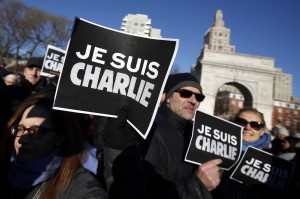These are dark days for those who want to believe that the pen is mightier than the sword.
The attack on French satirical newspaper Charlie Hebdo has caused grief and soul-searching around the world, and exposed the risks humorists can run — only intensified in an era of instant global communications where starkly opposed ideologies can collide.

British cartoonist Gerald Scarfe expressed his anguish in the Sunday Times newspaper with the image of a sword slicing off a hand holding a pen. In the Sunday Telegraph, Bob Moran depicted a cartoonist in full body armor under the slogan “Keep Calm and Carry On.”
For centuries, satirical stories and cartoons have mocked the powerful and sacred in the societies that produced them. Often they drew a harsh reaction. Offending an absolute monarch could mean death. Well into the 20th century, comedians from Lenny Bruce to the editors of British magazine Oz were prosecuted for offending society’s sensibilities.
Today, societies in countries like France are more diverse than ever before. Once overwhelmingly Catholic, France is a now an officially secular country with 5 million Muslims, about 7.5 percent of the population. There’s less consensus on what’s taboo and where the boundaries of taste and offense lie.
And now that words and images move around the world at the click of a mouse, there more chance for provocative humor to collide with rigid ideas, whether Islamic fundamentalism or North Korean communism.
Charlie Hebdo springs from a French satirical tradition that reaches back to the republic’s revolutionary roots: rude, scabrous, an enemy of power and piety. Its targets have included popes, politicians — and the Prophet Muhammad. Many Muslims believe all images of the prophet are blasphemous; Charlie Hebdo’s cartoons could be deliberately crude and outrageous, once showing Muhammad as a star in a porn shoot.
Some witnesses reported that the attackers who killed 12 people at the paper’s offices shouted “We have avenged the prophet.”
In the book “Globalization and Insecurity in the Twenty-first Century,” London School of Economics professor Christopher Coker said “The Satanic Verses” controversy was both caused by globalization and an illustration of its limits. The world is an ever-smaller place, but the gaps that divide us are wide.
“Rushdie’s novel was an example of a postmodern Western cultural genre (satire),” Coker wrote. “Western intellectuals recognized the genre but not the culture (the Quran). Islamic intellectuals recognized the culture but not the genre.”
The attack on Charlie Hebdo is the latest shocking reminder that humor has both power and consequences. That fact is not lost on imprisoned Russian punks Pussy Riot or detained Egyptian TV satirist Bassem Youssef, but often forgotten in the West, where it has become rare for humor to cause physical protest.
Since the attack on Charlie Hebdo that killed 12 people, hundreds of thousands of people around the world have gathered to proclaim “Je suis Charlie” (I am Charlie).
Despite the show of solidarity, some fear the violence will lead to self-censorship by artists and publishers.
British cartoonist Martin Rowson said last week that he wanted to respond to the Paris killing with a cartoon of Muhammad wearing a “Not in my name” T-shirt. Instead, Rowson drew himself slumped at his easel in a cartoon for The Guardian. His loved ones, the caption explained, “don’t want me to risk getting murdered offering a few of you lot a wry smile.”
MAD magazine editor John Ficarra, in a taped statement for CBS News’ “Sunday Morning” that was aired two days after the end of the France attacks, acknowledged initially being fearful of appearing on the program.
“By the simple act of appearing on camera denouncing the terrorists and defending the rights of cartoonists and satirists, would I be drawing a target on my back and the backs of my colleagues?” he said. “Unfortunately these days, those are not unfounded fears.”
But he closed with a defiant message.
“On the other hand, come Monday morning, my staff and I will be back at work on the next issue of MAD.
“What, us worry?”




